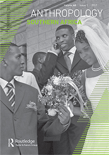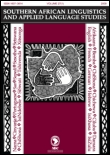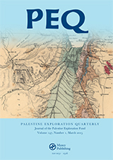
Southern African Humanities
Scope & Guideline
Connecting researchers to Southern Africa's vibrant heritage.
Introduction
Aims and Scopes
- Archaeological Research:
The journal highlights archaeological investigations across Southern Africa, emphasizing the material culture, settlement patterns, and social organization of past societies. - Historical Analysis:
It incorporates historical perspectives, analyzing colonial and post-colonial contexts and their impact on contemporary identities and cultural practices. - Cultural Heritage Studies:
The journal examines issues related to cultural heritage, preservation, and representation of marginalized voices within the historical narrative. - Interdisciplinary Approaches:
By integrating methodologies from anthropology, history, and archaeology, the journal fosters a comprehensive understanding of Southern African humanities. - Gender and Identity Studies:
There is a consistent focus on gender dynamics and identity formation within the archaeological record, challenging binary frameworks and exploring nuanced social identities.
Trending and Emerging
- Material Culture and Biographies:
There is an increasing emphasis on the biographies of objects and materials, exploring their roles in trade, identity, and daily life in past societies. - Decolonial Perspectives:
Emerging themes reflect a shift towards decolonial approaches, challenging established narratives and advocating for the representation of indigenous perspectives in historical discourse. - Gender and Social Dynamics:
Recent publications indicate a growing interest in the intersection of gender and social dynamics, moving beyond binary frameworks to explore diverse identities and roles in historical contexts. - Integration of Historical Linguistics and Archaeology:
The journal is increasingly highlighting the integration of historical linguistics with archaeological findings to better understand cultural and linguistic evolution in Southern Africa. - Environmental Archaeology:
Emerging studies are focusing on human-environment interactions, particularly how climatic changes have influenced settlement and subsistence patterns throughout history.
Declining or Waning
- Traditional Ethnographic Studies:
There seems to be a decline in the focus on traditional ethnographic studies that rely heavily on contemporary cultural practices without a strong archaeological or historical context. - Colonial Narratives without Critical Analysis:
Research that merely recounts colonial histories without critical engagement or exploration of their implications for modern identities and structures is becoming less common. - Biological Anthropology:
Themes centered on biological anthropology, particularly those focused solely on physical remains without cultural context, are appearing less frequently.
Similar Journals

Anthropology Southern Africa
Fostering interdisciplinary dialogue in the heart of Southern Africa.Anthropology Southern Africa is a prestigious journal published by Routledge Journals, Taylor & Francis Ltd, and is dedicated to advancing the field of anthropology through rigorous scholarship and critical discourse. Established in 2013 and converging through 2024, this journal sets a high standard in its category, currently holding a Q2 classification in Anthropology and a Q1 ranking in Cultural Studies for the year 2023, ensuring its position as a significant contributor to social science research. With a robust Scopus ranking that places it in the 82nd percentile for Cultural Studies and the 67th percentile for Anthropology, Anthropology Southern Africa serves as an essential platform for researchers, professionals, and students engaged in anthropological inquiry and cultural analysis. Although it is not openly accessible, the publication prides itself on high-quality submissions that explore diverse cultural phenomena and anthropological perspectives, thereby inviting interdisciplinary engagement and fostering a global academic dialogue.

Vjesnik Arheoloskog Muzeja u Zagrebu
Bridging Cultures Through Archaeological DiscoveryVjesnik Arheoloskog Muzeja u Zagrebu, published by the ARHEOLOSKI MUZEJ & ZAGREBU, is a vital platform for disseminating scholarly research in the field of archaeology. With its Open Access model established in 2007, the journal ensures that vital archaeological findings and theories are accessible to a global audience, fostering greater collaboration and knowledge-sharing among researchers, professionals, and students. The journal is based in Croatia and has been an essential part of the academic landscape since its inception, with convergence noted in years such as 1979 and 1981, and continuing consistently from 2014 to 2023. While it currently holds a Q4 ranking in both the Arts and Humanities and Archaeology categories, its contributions to the understanding of archaeological heritage in the region are invaluable. Positioned within the 30th percentile among its peers in Scopus rankings, the journal endeavors to elevate the discourse around archaeological practices and findings, making it an important resource for anyone engaged in the pursuit of archaeological knowledge.

Hesperis-Tamuda
Cultivating Interdisciplinary Dialogue Since 1973Hesperis-Tamuda is a distinguished open-access journal published by the University Mohammed V Rabat, Faculty of Letters and Human Sciences, focusing on interdisciplinary research in the fields of Arts, Humanities, and Social Sciences. Since its establishment, the journal has continuously provided a platform for innovative scholarly contributions, reflecting its commitment to facilitating knowledge exchange and promoting academic discourse. With a history dating back to 1973 and an evolving scope that embraces both archaeological studies and general social scientific inquiries, it has positioned itself within the academic community as a credible resource. The journal's rankings in Scopus reveal its relevance, ranking #290 in Arts and Humanities and #231 in Social Sciences, despite its percentile standings of 29th and 16th, respectively. Researchers, professionals, and students are encouraged to contribute their work to Hesperis-Tamuda, particularly since it has been open-access since 2016, enabling broader dissemination of research findings globally.

South African Journal of Cultural History
Navigating the Complexities of Cultural History in South AfricaSouth African Journal of Cultural History is a leading forum dedicated to the exploration and analysis of cultural history within the diverse context of South Africa. Published by the SOUTH AFRICAN SOCIETY FOR CULTURAL HISTORY, this journal serves as an essential resource for researchers, professionals, and students interested in understanding the intricate past that shapes contemporary societies. With an emphasis on interdisciplinary studies, it encourages contributions that delve into various aspects of cultural heritage, identity, and social dynamics. While currently not an open-access publication, the journal aims to provide insightful articles that foster academic discourse and promote the preservation and appreciation of South Africa's rich cultural history. By engaging with this journal, scholars can connect with a vibrant community committed to advancing knowledge in cultural history and enhancing the visibility of South African cultural narratives on a global scale.

Studijne Zvesti Archeologickeho Ustavu Slovenskej Akademie Vied
Exploring Slovakia's rich heritage through scholarly research.Studijne Zvesti Archeologickeho Ustavu Slovenskej Akademie Vied is a leading journal in the field of archaeology, published by the SLOVENSKA AKAD VIED, ARCHEOLOGICKY USTAV, based in Nitra, Slovakia. This esteemed journal, with the ISSN 0560-2793, has established itself as a vital resource for scholars and researchers, reflecting significant academic contributions in both the arts and humanities as well as social sciences. With a 2023 Scopus ranking placing it in the second quartile (Q2) for archaeology, it showcases rigorous research and innovative methodologies, essential for advancing archaeological studies. While it is not an Open Access journal, it continues to offer valuable insights into archaeological findings, theoretical frameworks, and interdisciplinary approaches. The journal serves as a bridge, connecting local Slovak archaeology with international discourse, making it an indispensable tool for students, professionals, and academics striving for a deeper understanding of the archaeological heritage of Slovakia and beyond.

Southern African Linguistics and Applied Language Studies
Fostering Innovation in Language StudiesSouthern African Linguistics and Applied Language Studies is a prestigious journal dedicated to the exploration and analysis of linguistics and applied language studies within the Southern African context. Published by Taylor & Francis Ltd, this esteemed journal has established itself as a significant platform for scholars and practitioners since its inception in 2003. With an impressive Q2 ranking in the Linguistics and Language category and a current Scopus rank of #430 out of 1167, it occupies a vital position in the academic landscape, appealing to a diverse readership keen on linguistic research, language policy, and applied linguistics. While the journal is not currently open access, it provides comprehensive insights and scholarly articles that foster understanding and innovation in linguistic practices and language education. As of 2024, the journal continues to deepen its impact through rigorous peer-review and a commitment to advancing knowledge, making it a key resource for researchers, educators, and students seeking to navigate the complexities of language within the Southern African region and beyond.

Complutum
Exploring the Depths of History and ArcheologyComplutum, published by the Universidad Complutense de Madrid, serves as a leading academic journal in the fields of Archeology and History. With a notable track record since its inception and a convergence stretching from 2011 to 2024, the journal has established itself as a pivotal platform for scholarly discourse in these disciplines. Recognized in 2023 with a Q2 ranking in Archeology and Arts and Humanities, as well as a Q1 ranking in History, Complutum demonstrates its commitment to quality research, attracting contributions from leading experts and emerging scholars alike. The journal's impact is further evidenced by its competitive ranks within various Scopus categories, particularly its placement in the 77th percentile for History and 64th for Archeology. As a printed publication without open access options, Complutum caters to a specialized audience, providing a forum for in-depth analysis and discussion on archaeological findings and historical interpretations. Researchers, professionals, and students engaged in these fields will find Complutum an invaluable resource for advancing knowledge and fostering academic collaboration.

JOURNAL OF THE POLYNESIAN SOCIETY
Illuminating the Heritage of the IslandsJOURNAL OF THE POLYNESIAN SOCIETY, published by Polynesian Soc Inc, is a distinguished periodical that aims to disseminate high-quality research in the fields of anthropology, archaeology, and cultural studies. With an ISSN of 0032-4000 and E-ISSN 2230-5955, this journal serves as a key resource for scholars and practitioners interested in the rich historical and cultural narratives of the Polynesian region. Since its inception, the journal has published a multitude of scholarly articles, reflecting a convergence of research from 1971 to 2022, thus establishing itself as a foundational text within its domain. The journal is indexed in notable categories with a Q4 ranking in anthropology and a Q3 in both archaeology and cultural studies as of 2023, highlighting its relevant contributions to the academic community. Moreover, its impressive Scopus ranks position it within the 80th percentile for archaeology and the 67th percentile for anthropology, showcasing its dedication to scholarly excellence. Although not an open-access publication, the journal remains a vital avenue for academic discourse and exchange, making it a significant resource for researchers, professionals, and students dedicated to understanding the diverse cultures of the Pacific Islands.

Palestine Exploration Quarterly
Fostering Discourse on Palestine's Archaeological TreasuresPalestine Exploration Quarterly, published by Routledge Journals, Taylor & Francis Ltd, is a leading academic journal that has been at the forefront of archaeological, historical, and cultural studies concerning Palestine since its inception in 1865. With an impressive Q1 ranking in multiple categories including Archaeology, History, Religious Studies, and Visual Arts and Performing Arts, the journal is recognized for its rigorous peer-reviewed content that significantly contributes to the understanding of cultural heritage and societal dynamics in the region. The UK-based journal offers an array of scholarly articles, reviews, and reports aimed at researchers, professionals, and students in the humanities and social sciences. With a strong focus on advancing knowledge and fostering academic discourse, the Palestine Exploration Quarterly remains an invaluable resource for those engaged in the exploration and interpretation of Palestine's rich history and heritage, now accessible through various academic libraries worldwide.

MISSISSIPPI QUARTERLY
Provoking Thought and Discussion in Literary AnalysisMISSISSIPPI QUARTERLY, published by Johns Hopkins University Press, is a distinguished journal that delves into the realms of Cultural Studies and Literature and Literary Theory. Since its inception, the journal has served as a vital platform for scholarly exchange and critical analysis, making significant contributions to understanding literary and cultural phenomena through varied interdisciplinary approaches. With an ISSN of 0026-637X and an e-ISSN of 2689-517X, it operates without Open Access, ensuring a selective dissemination of high-quality research. Despite being positioned in the Q4 quartile based on the 2023 ranking, it maintains a unique appeal for researchers, professionals, and students seeking to navigate the complexities of culture and literature. The journal has converged its publishing years to remain relevant amid evolving academic discourses, ensuring that it continues to address contemporary challenges and themes in literature. As an important academic resource, MISSISSIPPI QUARTERLY promises to stimulate discussion and provoke thought, inviting new voices to contribute to the ongoing dialogue in these critical fields.